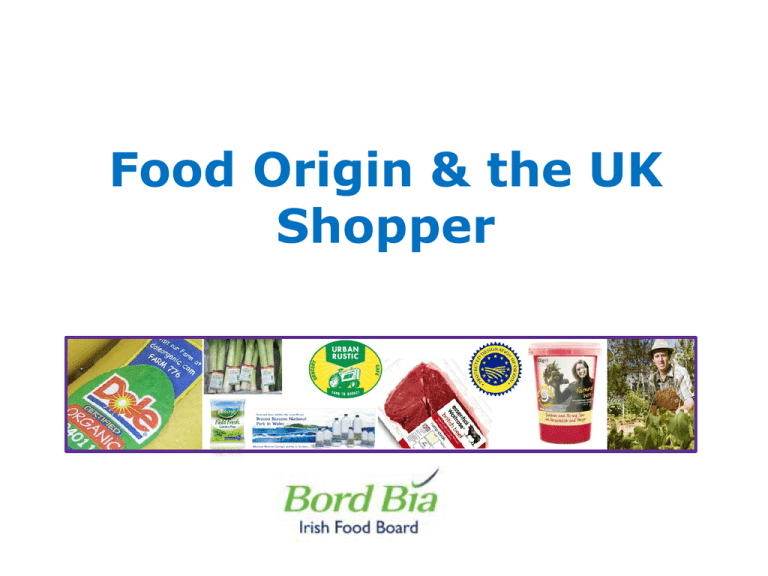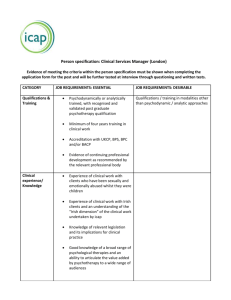Food Origin & the UK Shopper 1
advertisement

Food Origin & the UK Shopper 1 Contents Section Contents Introduction About the report and approach 2-6 Executive Summary Key findings 7-8 Chapter 1 The importance and role of food origin in the UK Chapter 2 Do UK consumers really want to buy British? 18-22 Chapter 3 What does ‘Irish’ food mean to a UK consumer? 23-27 Chapter 4 Learning on origin labelling 28-31 For more information Contact details 9-17 32 Introduction • The aim of this report is to provide insight into the importance and meaning of ‘origin’ to the UK consumer and understand the true nature of the demand for British sourcing: is it really a consumer need or is it a phenomena riven more by retailers? The report seeks to answer: – What is the relevance and meaning of food ‘origin’? – Is the growing focus on the origin of food in the UK an opportunity or threat to Irish producers? – Is the growing desire of UK retailers to source ‘British’ produce really what consumers want? – How can Irish producers leverage food origin more effectively? – What does ‘Irish origin’ mean for UK consumers? • As part of Bord Bia’s Consumer Lifestyle Trends programme the issue of food origin has been tracked through the trend Keeping It Real. The origin and provenance of food has become more important to consumers in recent times as a mark of quality and authenticity. The recession has refocussed consumers on the need for greater value and as pursue strings have tightened, all purchases have come under greater scrutiny and attention. Consequently, the value equation has often been reassessed and greater weight placed on certain attributes. Origin has been one such attribute that has received greater attention and focus. 3 Introduction • However, it is important to recognise that the role of origin and its meaning is different to different consumers and within different categories: – Origin can be about trusted sources – is it made to the highest standards or is it safe? – Origin can be about quality – is it fresh or is it well made? – Origin can be about authenticity – is it the genuine article? – Origin can be about taste – what unique flavours and experiences does that place offer? – Origin can be about ethics – how is the live stock cared for and what is the environmental impact? – Origin can be about local support – how can I support local industries and my community? • The many dimensions of origin mean that its importance can often be misread or overly emphasised often when other attributes are more important to consumer choice. 4 Methodology • To unpick this complex issue a multi methodology approach was utilised to both gain a deep and rich understanding of the meaning of origin and, to provide a clear quantitative sense of where it sits in the hierarchy of factors influencing choice. • 8 qualitative groups amongst main grocery shoppers: – Split amongst ‘food engaged’ and ‘less food engaged consumers’ – Split by geography: London, Newcastle, Cardiff and Edinburgh – Conducted in April 2010 5 Methodology • • Quantitative on line survey of main grocery and household products shoppers: – Nationally representative sample of 2001 respondents – Conducted May 2010 – Research was conducted by 6 Executive Summary • Origin is not the most important factor in food choice; in some categories it has very little relevance. • Time pressures and the habitual nature of grocery shopping means that often very little attention is given to origin labelling at the time of purchase. • The misuse and lack of clarity around origin labelling means that many consumers are sceptical about what it really means. Consumers are most interested in where the product began or was raised. • Origin’s role is often to act as a proxy for other factors that determine choice within food. Origin often helps indicate freshness, quality and taste. 7 Executive Summary • Whilst British labelling is seen in a positive light, it is often largely ignored. • British is more important in the categories where the produce is less processed and the value of origin labels are clearer i.e. it indicates where the product began or was raised. • Equally, to reduce choice to just British produce would be unwise as many consumers would perceive this to be a reduction in choice. • Perceptions of Irish food in the UK is positive. Most of the associations reflect a more rural and traditional view of Ireland. However, deep perceptions do not exist and ‘Irish’ is not a strong a positive differentiator. • There is a clear opportunity to build the equity of Irish food in the UK and there are few (if any) negatives that need to be addressed in this process. • Whilst not explicitly explored by the research, this finding suggests that Irish dairy production and the products that stem from this industry are likely to have strong equities in the UK. 8 Chapter 1: The importance and role of food origin in the UK The importance and role of food origin in the UK Most people like the idea of knowing where their food comes from In the UK only 1 in 8 consumers said that knowing the origin of the food they buy was not important. The majority clearly care, but this is not a high priority concern. In fact only 10% of the consumers surveyed saw origin as very important and a further 19% as important; the majority (67%) of UK consumers see origin as somewhat important (see Chart 1). This picture varies according to the level of food engagement, past research has highlighted a strong spectrum of different levels of food engagement in the UK (and Ireland). The levels of importance of knowing the origin of the food bought varies significantly by segment. Food engaged consumers (the fanatical foodies – approximately 1 in 10 food buyers) place higher importance on food origin, with 60% saying it is very important or important. Around 30% of the least engaged group (the disengaged – approximately 1 in 5 food buyers) say that it is not at all important. Differences also exist geographically with the Welsh and the English more likely to say that origin is very important or important. For people in Northern Ireland and Scotland origin has less of a priority. Equally, significant differences exist by retail chain with the Waitrose shopper placing greater importance on the origin of food with 53% saying it is very important or important . The Asda shopper is at the opposite end of the spectrum where only 23% say origin is very important or important. Clearly, the power and importance of leveraging origin in a brand’s positioning is highly dependent on the target audience. CHART 1 How important is it to you that you know the origin of the food that you buy? % 100 80 57 60 40 20 19 14 10 0 Very Important important Somewhat important Not at all important Source: The Futures Company 2010 10 The importance and role of food origin in the UK But, origin does not feature in consumers top-of-mind food decision criteria Despite many consumers stating that food origin is important, it is critical to recognise that origin does not feature in consumers top-of-mind food decision criteria. Other purchase considerations, such as value, quality, taste and health are higher up the hierarchy (see Chart 2). It is important to recognise that these other attributes are primary drivers of choice and consumers will be assessing food against these attributes before taking into account more secondary or territory factors. Albeit, origin can still play an important role as it is sometimes a short-cut or proxy for these more important attributes e.g. local equals fresh. Equally, in recessionary times, it is not surprising that people are very value conscious and this is rated the most important attribute overall. Generally, the top 5 attributes do not vary depending on the level of food engagement – they are true for all consumers. However, the ranking does change based on the level of food engagement. The more food engaged place attributes such as the quality and freshness higher in their decision criteria. The less food engaged tend to place value as a more important or the top attribute with taste as a close second. Clearly, origin in its own right is not a primary driver of choice for any consumers. Chart 2 What is important to you when you buy food? I get good value 78 It is good quality 75 It tastes good 74 It is fresh 69 60 It is healthy/nutritious It all gets eaten, not thrown 55 I can buy it at my local supermarket Clear ingredient labeling It is cheap It is low fat 50 35 35 31 Source: The Futures Company 2010 11 The importance and role of food origin in the UK At best origin is a secondary factor driving food choice Attributes that relate to the origin of food tend to be of lower importance. Whilst the food engaged place more importance on attributes such as ‘produced in Britain’ and ‘It is locally produced’ (43% and 44% respectively) they remain attributes that lie outside the top 10 most important attributes in food choice (see Chart 3). Equally, time pressures and the habitual nature of grocery shopping means that often very little attention is given to origin labeling at the time of purchase. Consumers tend to either buy what is familiar or focus on the key decision criteria that are of most importance to them. Consequently, there are many categories where a concern for origin doesn’t feature at all in driving choice at the point of purchase. Furthermore, even amongst those consumers who look for the origin of products, they are unlikely to apply this criteria consistently to all food purchase decisions. Origin is clearly not a ubiquitous attribute that is sought for by all consumers or that plays an important role in all categories. I don’t look at labels – I just want to get in and out of the shop quickly. Chart 3 What is important to you when you buy food? Animals & people are treated humanely 29 27 Produced in Britain 25 It has a long shelf life It is produced locally 22 From companies/brands 21 18 Convenient & saves time/energy Minimal food miles/ distance product travels 16 14 Fairtrade product Buy from producer or farmer 8 It is organic 8 None of the above 1 Source: The Futures Company 2010 Less food engaged, London 12 The importance and role of food origin in the UK The importance of origin varies by category Whilst origin plays different roles in different categories, it also has different levels of importance. A concern about origin is most likely to feature in meat: it is often the main part of meal so quality is most important. Equally, recent scares and focus on animal welfare have raised concern. The next most likely categories for origin to be considered relevant are dairy and eggs, where consumers are concerned about freshness and farming; and lastly vegetables where there can be a concern for freshness and seasonality. 3. Fruit and Veg 2. Eggs and dairy 1. Meat In most other categories, consumers are, for the most part, less interested in the place of origin or country, but this is not to say that origin cannot be leveraged in other categories or as part of a brand positioning. Nevertheless, it is important to fully understand the role origin plays and decide if it is really an important factor in improving the overall proposition of the brand. In some instances, overplaying origin may just confuse the key messages you are trying to convey to the consumer. 13 The importance and role of food origin in the UK Origin can be used to help consumers find different experiences and enjoy global culture We should also recognise that origin is not just about more local and British produce. One of the most important roles origin plays for those who are interested in food is a route to find different experiences and enjoy global culture: • Certain countries are seen to have greater expertise in products that can also be sourced locally. • Sometimes the ‘real thing’ comes from a distance, e.g. Italian salami, French cheese etc. • Sometimes people like to experiment and try different things from foreign cultures. Consumers want choice and origin is way of showing to consumers there is choice. Just local or British options may be seen as narrowing that choice not improving it. 14 The importance and role of food origin in the UK Where origin is most powerful, origin is acting as a proxy for other criteria important in food choice Often, origin acts as a proxy for other criteria important in food choice. Almost universally, origin labelling is a shortcut usd by consumers to indicate quality and freshness of produce; the less distance a product travels from where it is picked the fresher and better quality it is likely to be (see Chart 4). Equally, it can play a role in assessing broader social and environmental impacts. Buying local can be a way to feel you are ‘doing your bit’ for the wider community or your country. However, it is important to note that this is not a primary driver of choice, it is a secondary or even territory attribute that can leave a warm glow and sense of contributing on a broader level. But, it is important to note that the same consumers will purchase Fairtrade products from other countries and feel equally good about these choices. Chart 4 Why is it important for you to know the origin of your food? Helps you know how fresh it is 53 To support farmers/ producers in my community 49 46 To know its produced humanely 42 To support my national economy To know its produced without exploiting farmers/worker 41 Concerns about food safety /standards 40 Reduce food miles for environment Supporting local jobs – our local farmers and butchers. Less food engaged, Newcastle It’s not been shipped around and it’s fresh Keen foodie, Newcastle 34 Some places grow/produce particular foods better 27 Tastes varies with origin 26 Source: The Futures Company 2010 15 Equally, it can be difficult to judge what origin refers to People can be skeptical about origin information Even today consumers are feeling bombarded by information and are skeptical about claims regarding origin. There have been many instances where consumers have felted duped by misleading labelling that is marketing gimmick and not a genuine source of origin – M&S Lochmuir is a brand name and not a place. Equally, it can be difficult to judge what origin refers to It is vital to counter consumer skepticism by giving clear information from a consumer perspective. Consumers are most interested in where the product began or was raised – not where it was packaged or where the head office is!. Equally, people feel bombarded by symbols and are confused about what they mean. There are multiple symbols for the same thing, which can undermine trust in symbols. When providing information about origin it is important to be clear and honest, and to provide simple proof points. What does origin refer to? The place it was grown? Where the ingredients are sourced? This bread is British wheat, but it doesn’t say where it is made. Less food engaged, Newcastle Where it was made? Where the company was founded or is based? How is this tea Dorset tea? They don’t grow tea in Dorset. Tea comes from India! Keen foodie, London 16 Key takeaways • Most people like the idea of knowing where their food comes from. However, the power and importance of leveraging origin in a product’s positioning is highly dependent on the target audience. • Clearly, origin in its own right is not a primary driver of choice for any consumers. Origin’s role is often to act as a proxy for other factors that determine choice within food: • • Mostly it represents quality and freshness For many it is a means to ensure that you have found the genuine article. • Equally, time pressures and the habitual nature of grocery shopping means that often very little attention is given to origin labeling at the time of purchase. • Consumers want choice and origin is way of showing consumers that there is choice. Just local or British options may be seen as narrowing that choice and not improving it. • The misuse and lack of clarity around origin labelling means that many consumers are sceptical about what it really means. Consumers are most interested in where the product began or was raised. 17 Chapter 2: Do UK consumers really want to buy British? Do UK consumers really want to buy British? What is British anyway: do most consumers really know? When asked 95% of UK respondents thought that England was in the British Isles and 92% thought that Scotland and Wales were included. This falls to 82% for Northern Ireland, and whilst strictly not in the definition, around 2 in 5 people think that the Republic of Ireland is part of the British Isles. These figures highlight the blurred nature of the definition of British in terms of geographical understanding. A factor that is further accentuated when you look at varying responses by country: the Welsh, at 42% are the most likely to say the Republic of Ireland is part of the British Isles, and the Northern Irish at 31% are the least likely to say to say the Republic of Ireland is part of the British Isles. Which countries do you consider are included with the British Isles? % Agree 95% 92% This it is not just simply a geographical blur, many consumers see the Republic of Ireland as culturally similar - the Republic of Ireland is certainly seen a member of the same family. Irish is British – England Ireland, Scotland Wales Less food engaged, Newcastle We’re closer to Ireland than England. They are Celts too. It’s a similar culture. 92% 81% 39% Keen foodie, Caerphilly 19 Do UK consumers really want to buy British?? Most people see buying British as important The importance of food grown and manufactured in Britain is very much like origin, for many it is not a major driving attribute for food choice. Less than a 3rd of UK consumer see it as important or very important and the majority (67%) of UK consumers see it as somewhat important (see Chart 5). Equally, 1 in 8 UK consumers do not see it as having any importance at all! Buying food grown and manufactured in Britain is not a primary motivation for the majority of consumers. Equally, the importance of buying food grown and manufactured in Britain varies by geography; it is the most important to the Welsh with 33% rating it as important or very important, and least important to the Northern Irish with 20% rating it as important or very important. Notably the importance of buying food grown and manufactured in Britain varies significantly by retailer chain. The Waitrose shopper places greater importance on food grown and manufactured in Britain with 46% seeing it as important or very important, the Co-op shopper is next with 43%. Notably, the levels are significantly lower for Sainsburys and Tesco with 29% and 26% respectively seeing it as important or very important. Chart 5 How important is it to you that the food you buy is grown and manufactured in Britain? % 60 57 50 40 30 20 20 10 15 8 0 Very important Important Somewhat important Not at all important Source: The Futures Company 2010 20 The importance of buying British varies by category Buying British is more important in some categories Buying British is more important in the categories where origin is key in determining choice. Here British represents many of the attributes origin labeling is used to signify, such as quality and freshness. But at best it is only a 3rd of UK consumers that go out of their way to buy British. Equally, buying British is more important in the categories where the produce is less processed and the value of origin labels are clearer i.e. it indicates where the product began or was raised. Categories such as bread, fresh meat, milk and yogurts come top in terms of the percentage of consumers going out of their way to always buy British (see Chart 6). These factor is reinforced by the fact that 52% of UK consumers agree with the statement ‘I never consider if it is British or not’ for alcoholic drinks and 36% for ready meals. It doesn’t matter if its Irish or where it’s from to me – if I like the look of something I will try it and the sausages sound a bit exotic Less food engaged, Caerphilly Chart 6 I go out of my way to always buy British Bread 33 Fresh meat (unprocessed) 33 26 Milk and yogurts Meat pies, sausages/ other processed meat 25 24 Fresh vegetables 21 Cheese 13 Fresh fruit Frozen vegetables 12 Jams and condiments 11 9 Ready meals 6 Non alcoholic drinks Alcoholic drinks 4 Source: The Futures Company 2010 21 Key takeaways • Most people see buying British as important. But equally, buying British is more important in the categories where the produce is less processed and the value of origin labels are clearer i.e. it indicates where the product began or was raised. • Whilst British labelling is seen in a positive light, it is often largely ignored. Equally, to reduce choice to just British produce would be unwise as many consumers would perceive this to be a reduction in choice • • British represents many of the attributes other types of origin labelling is used to signify such as quality and freshness. But at best it is only a 3rd of UK consumers that go out of their way to buy British. • • The Waitrose shopper places greater importance on food grown and manufactured in Britain with 46% seeing it as important or very important, the Co-op shopper is next with 43%. Notably, the levels are significantly lower for Sainsbury's and Tesco with 29% and 26% respectively seeing it as important or very important. Categories such as bread, fresh meat, milk and yogurts come top in terms of the percentage of consumers going out of their way to always buy British. Equally, buying British is more important in the categories where the produce is less processed and the value of origin labels are clearer i.e. it indicates where the product began or was raised. Whilst more British labelling is seen in a positive light, it is often largely ignored in many purchase decisions. 22 Chapter 3: What does ‘Irish’ food mean to a UK consumer? What does ‘Irish’ food mean to a UK consumer The meaning of Irish origin in the UK is mainly positive Consumers do not have strong perceptions about qualities of Irish foods. Most of the associations are positive and reflect a more rural and traditional view of Ireland. The strongest attribute that UK consumers agreed with was ‘made with traditional ingredients/processes’ with 34% of respondents agreeing with this statement (see Chart 7). Equally, most UK consumers assume Irish food is a bit like English or Welsh or Scottish food. Hence, associations are positive and the geographical proximity makes it feel ‘local’. However, the most notable factor is how neutral (neither positive or negative) the perception of Irish food is to many UK consumers with 30% of respondents ‘stating none of the above’. This was significantly lower for the more food engaged consumers in the UK, albeit that 1 in 8 still had no real view of what Irish food represents. There is a clear opportunity to build the equity of Irish food in the UK and there are few (if any) negatives that need to be addressed in this process. I would assume they would be the same standard Keen foodie, Edinburgh Chart 7 Which of these attributes do you feel apply to food manufactured in Ireland? Made with traditional ingredients/processes 34 None of the above 30 It is food that tastes great 30 29 High production standards It is good value for money 28 It is simple food 18 Made in harmony with nature/environ. 18 Small artisan companies not global manufactures 18 Highly processed 3 Cheap and poorly made 3 Source: The Futures Company 2010 24 What does ‘Irish’ food mean to a UK consumer There are categories where Irish origin has strong credentials When asked to directly compare many UK consumers see British as better in some key categories. But this is never the majority in any category – even beef. In beef only 30% of UK consumers say British is better quality. Notably, Beef is the category were the desire for British sourcing is the strongest versus Irish sourcing. Given that the survey was amongst UK consumers we should not be surprised that British produce would be favoured in the majority of categories in the considered survey. The UK consumers that are more food engaged generally see Irish to be of similar standard to British and hence, the British bias is less amongst these consumers. The notable category that breaks this rule is butter where 18% of UK consumers say Irish butter would be better versus 16% who say that British butter would be better – this difference is even greater amongst the food engaged. Whilst not explicitly explored by the research, this finding suggests that Irish dairy production and the products that stem from this industry are likely to have strong equities that can be communicated by highlighting the Irish origin of the milk that goes in to making them. Chart 8 Which would be better quality British or Irish? Irish would be better They would be of similar standard Country of origin has no impact British would be better % agree 100 10 80 13 15 13 14 16 60 31 40 18 12 19 30 35 20 30 26 16 0 Beef I have bought Kerrygold – dairy definitely as they are famous for dairy farming. Don’t know Sausages Butter Source: The Futures Company 2010 Keen foodie, Edinburgh 25 Key takeaways • Perceptions of Irish food in the UK is positive. Most of the associations reflect a more rural and traditional view of Ireland. • However, deep perceptions do not exist and ‘Irish’ is not a strong positive differentiator. • There is a clear opportunity to build the equity of Irish food in the UK and there are few (if any) negatives that need to be addressed in this process. • Overtly communicating Irish origin can be beneficial in certain categories - dairy and meat produce would benefit here. • • The notable category is butter were 18% of UK consumers say Irish butter would be better versus 16% who say that British butter would be better. Whilst not explicitly explored by the research, this finding suggests that Irish dairy production and the products that stem from this industry are likely to have strong equities in the UK. 26 Chapter 4: Learning on origin labelling In certain categories origin labelling can be helpful as it fulfils a key need 1. Text description Highlighting the place of origin in the name of the product can have relevance in all categories. This can be more relevant where the origin signifies a differentiating factor in the category e.g. taste, quality, craftsmanship etc. or it is integral to the brand’s heritage. 28 In certain categories origin labelling can be helpful as it fulfils a key need 1. Text description Flags really only have a role in a few key categories such as meat, diary and, fruit and vegetables. 2. Flag In other categories they are probably adding unecessary clutter to the label. The role for consumers is, more often than not, to symbolise quality and freshness. The British flag will be interpreted as meaning grown or raised in Britain. Using a flag on a product that does not meet these criteria would be considered misleading . An Irish flag for a product sold in the UK would not necessarily add value. 29 In certain categories origin labelling can be helpful as it fulfils a key need 1. Text description Often an assurance symbol is more critical than an origin label. 2. Flag 3. Assurance symbol Here it is critical to understand which assurance label has most meaning and relevance in a category e.g. Fairtrade in coffee or chocolate. Where short hand proxies / symbols do not exist, it can be important to communicate the critical attributes that drive choice. For instance, whilst Irish produce cannot use the British Assured Food Standard label, it may be worth while communicating that the produce is made to British standards if appropriate. 30 In certain categories origin labelling can be helpful as it fulfils a key need 1. Text description 2. Flag 4. Name and location of the farm or producer 3. Assurance symbol More detailed information about the source of the product can be important for the more food engaged consumer and reinforce aspects of quality, authenticity and true provenance. Here information such as the county, town or even farm can enrich the story of the product’s origin. However, this information can be more recessed on the label or packaging as the more food engaged, for whom it is relevant, will search for it. 31 For further information • For further information about this report, please contact: – Tel: +353 1 668 5155 – Email: info@bordbia.ie • A copy of this report and other marketing reports are at www.bordbia.ie 32








